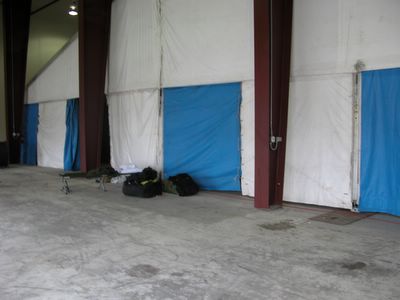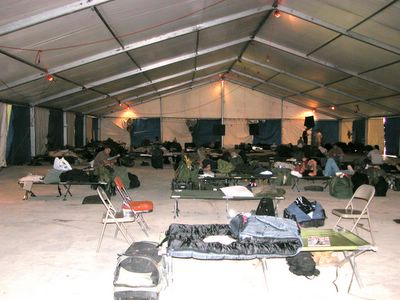Communications Specialist Adele Stan, together with the M.O.R.E. team of Issues Mobilization Specialist Brendan Danaher, and Health & Safety Specialist Milly Rodriguez, were sent to Baton Rouge, Louisiana, in mid-September to assess the needs of AFGE members--those affected by Hurricane Katrina, and those deployed in the disaster relief efforts. These are their blog entries.
Hungry for home


photo by Adele M. Stan for AFGE
Home is a hangar.


photo by Adele M. Stan for AFGE
Tent living.
HAMMOND, LA.--We had heard that a contingent of Border Patrol officers were being housed at a small airport outside of Baton Rouge. We arrived to find living quarters for 200 in a single vinyl tent erected in a helicopter hangar. The tent was a relatively new feature, we were told by the officers. They had been there since the day after Katrina hit New Orleans, sleeping on cots in the open hangar. Five port-a-johns were all there was in terms of rest rooms to accommodate the 200 men. There were no showers for the first four days; that was when the officers were working 24-hour shifts, evacuating the New Orleans International Airport. (For his 24-hour shifts, one officer said, he had received only 12 hours of pay.)
"It was unbelievable," one officer told me. "There was human excrement from one end of the facility to the other. I never saw so many sick people."
Some 5,000 New Orleaneans, the officer estimated, were holed up there, seeking shelter and a ticket out. Every day, for three days, the Border Patrol officers moved people out of the facility, living not unlike the evacuees themselves. No showers. Overflowing potties. No real food--just MREs.*
The officers were then dispatched on 24-hour and 12-hour shifts to police the streets of New Orleans. "But by the time we got there," one officer explained, "most of the looting was over."
They have little idea of just what they've been exposed to by way of toxins. They were vaccinated for hepatitis and other diseases likely to be borne of unsanitary conditions, and were also given gammaglobulin shots to boost their immune systems. They take tetracycline, an antibiotic, every day as a preventive measure against bacterial threats.
Now told that they're to ship out--go back home to San Diego or Laredo or McAllen, or other spots along the Southern border--they were asked to fill out a questionnaire that one officer said comprised only three questions, including a request to list what toxins the respondent had been exposed to. "How do I know?" he asked. "How do I know what was in that dust coating the streets of the French Quarter?"
Once the levees broke, waters containing benzene, petrol, PCBs, and who knows what else, filled the streets of the lower-lying areas. (Not to mention, of course, sewage and decomposing bodies.)
I got the distinct impression that no higher-ups from the Department of Homeland Security (DHS) were around. When I asked if any of the DHS managers had shown up from time to time, the Border Patrol officers just smiled and shook their heads. Indeed, the command structure at this location seemed to be just officers and their team leaders.
Orders came from a voice behind some curtain in Washington.
When you ponder the numbers of people, eager to help, like these Border Patrol officers--people who have been living in day-to-day uncertainty since the storm began, have seen awful sights on a far grander scale than they're accustomed to at the border, and who sit wondering whether something they breathed in September will mean illness in July--it's hard to overestimate the mental health crisis soon to come, not just among evacuees, but among those dispatched to help them. No mental health professionals had been to their quarters, the officers told me. No EAP; no instructions on where to seek help, if needed. A Catholic chaplain did make regular visits to the site, and was there during our visit.
Two days ago, this particular Border Patrol contingent was told that they would be heading home the next day. They packed up their duffles, only to find the order rescinded. One officer was eager to return to his wife and new baby; the baby was two weeks old when he deployed. It wouldn't be quite as bad, another officer explained, if they were actually doing something. But for the last three days, they've been hanging out in a hangar, hungry for home.
* MRE--Meals ready to eat.
 The Katrina Files
The Katrina Files

0 Comments:
Post a Comment
<< Home